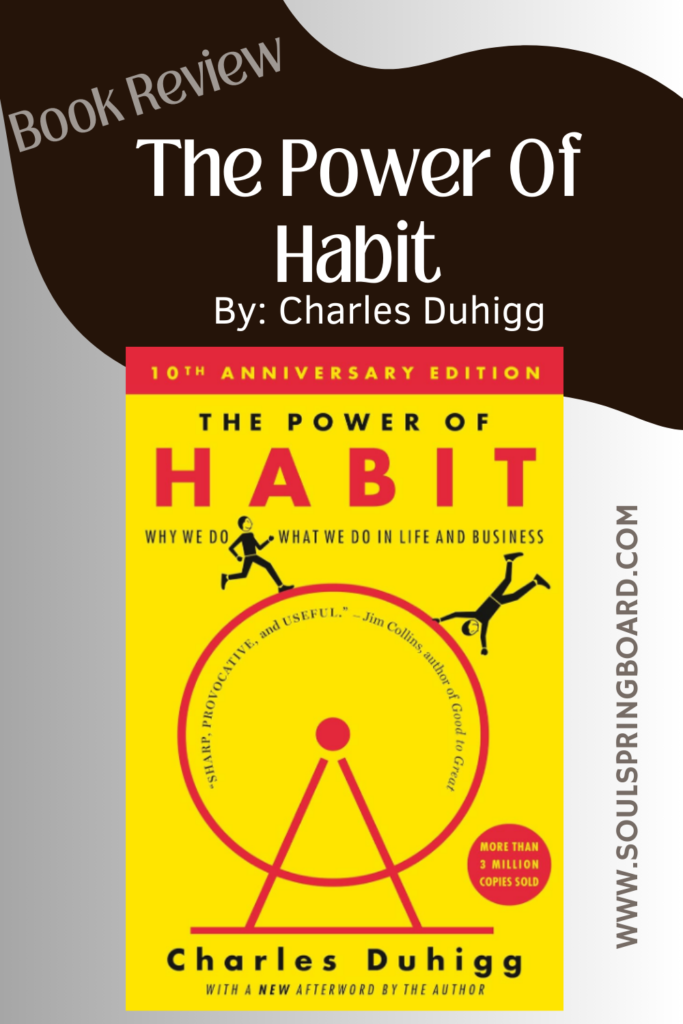The Power Of Habit: A Comprehensive Review
If there’s one thing we can all agree on, it’s that habits play a significant role in our daily lives. From the moment we wake up to the time we go to bed, we are constantly navigating through a series of routines and behaviors that have become ingrained in us. In his book, “The Power of Habit: Why We Do What We Do in Life and Business,” Charles Duhigg explores the fascinating science behind our habits and how we can harness their power to transform our lives.
With captivating storytelling and in-depth research, Duhigg dives deep into the psychology behind habits, providing readers with valuable insights and practical strategies to change those habits that hold us back and cultivate those that drive us forward.
The Power Of Habit: An Overview
“The Power of Habit: Why We Do What We Do in Life and Business” by Charles Duhigg is a thought-provoking book that explores the science behind habits and how we can use this knowledge to change our behavior. Duhigg delves into the habit loop, the role of cues and rewards, and outlines the golden rule of habit change.
The Power Of Habit: Key Concepts
The Habit Loop
At the core of the book is the concept of the habit loop, which consists of the cue, routine, and reward. Duhigg explains that habits are formed through a repetitive cycle, where the brain actively seeks a reward whenever it encounters a specific cue. This loop is essential for understanding how habits are formed and how they can be changed.
The Role Of Cues And Rewards
Duhigg emphasizes the importance of identifying the cues that trigger a habit and understanding the rewards that reinforce it. He discusses how cues can be internal or external, and how the craving for a reward drives the habit.
By understanding these cues and rewards, individuals can begin to modify their habits and make positive changes in their lives.
The Golden Rule Of Habit Change
In the book, Duhigg reveals the golden rule of habit change: keep the cue and the reward the same, but change the routine. He explains that by altering the routine that follows a specific cue, individuals can effectively change their habits.
He provides numerous examples and strategies to help readers apply this rule to various aspects of their lives.
The Power Of Habit: Research And Evidence
Duhigg supports his theories and concepts with numerous case studies that illustrate the power of habits. From the story of an Olympic swimmer to the success of a large multinational corporation, these case studies provide real-life examples of how habits shape individuals and organizations.
In addition to case studies, Duhigg also discusses scientific studies that explore the science behind habit formation and change. He presents research from psychology, neuroscience, and other fields to uncover the mechanisms that drive habits.
This scientific evidence adds credibility to his arguments and helps readers understand the underlying processes of habit formation.
Applying Habits In Daily Life
Personal Habits
Duhigg explores how habits can be applied in various aspects of daily life, from personal routines to health and wellness. He discusses the power of keystone habits. These habits have the potential to spark positive changes in other areas of life.
Readers are provided with practical strategies to identify and modify their own personal habits, leading to a more productive and fulfilling lifestyle.
Habits In The Workplace
The book also delves into the world of work and how habits can shape our professional lives. Duhigg explains how organizational habits can influence productivity, teamwork, and overall success.
He offers insights into creating a habit-focused work environment, building successful team habits, and using habits to shape customer behavior.
Habit Formation In Children
Duhigg explores the importance of habit formation in children and provides guidance for parents and educators. He highlights the role of habits in shaping a child’s behavior and offers strategies for promoting positive routines and behaviors.
By understanding the science behind habit formation, adults can help children develop healthy habits from an early age.
Benefits Of Understanding Habits
Improved Efficiency And Productivity
One of the primary benefits of understanding habits is the potential for improved efficiency and productivity. By recognizing the cues and rewards that drive our habits, we can make conscious changes to our routines and optimize our time and energy.
This leads to increased productivity and a greater sense of accomplishment in both personal and professional pursuits.
Healthier Lifestyle Choices
Understanding habits can also lead to healthier lifestyle choices. Duhigg explores how habits play a significant role in areas such as exercise, diet, and self-care.
By identifying and reshaping habits related to unhealthy behaviors, individuals can create lasting changes that promote physical and mental well-being.
Successful Behavior Change
Perhaps the most significant benefit of understanding habits is the potential for successful behavior change. Duhigg provides readers with practical strategies and insights to break free from negative habits and replace them with positive alternatives.
By understanding the underlying mechanisms of habit formation, individuals can navigate the path to lasting behavior change.
Critiques And Limitations
One critique of the book is the potential oversimplification of habit formation. While Duhigg presents a clear and intuitive model of the habit loop, some readers may feel that the complexities of individual behaviors and emotions are not fully accounted for.
It is important to recognize that not all habits follow a straightforward cue-routine-reward pattern.
Another limitation with The Power of Habit, is the relatively narrow focus on habits as the primary driver of behavior. While habits undoubtedly play a significant role, other factors such as beliefs, values, and external influences also shape our actions.
Duhigg acknowledges this to some extent but primarily emphasizes the power of habits in driving behavior.
As an alternative approach, consider layering the advice given by Duhigg with other self-help and motivational resources. You can view additional resources by clicking here.
Integration With Other Self-Help Approaches
Combining Habits With Goal-Setting
Duhigg suggests that habits should be used in conjunction with goal-setting to achieve optimal results. By creating habits that align with specific goals, individuals can develop a consistent routine that propels them towards success.
Goals provide direction, while habits provide the structure needed to make progress.
Habits And Mindfulness Practices
The integration of habits with mindfulness practices is another approach Duhigg explores. Mindfulness can help individuals become more aware of their habits and the underlying motivations driving them.
By cultivating mindfulness, individuals can make conscious choices about their habits and create positive behavior patterns.
Using Habits To Complement Other Behaviors
Duhigg emphasizes the compatibility of habits with other behavior change strategies. Whether it is therapy, counseling, or self-help techniques, habits can be used to support and enhance these approaches.
By incorporating the power of habits into existing behavior change strategies, individuals can increase their chances of long-term success.
Practical Tips For Habit Formation
Identifying And Analyzing Current Habits
Duhigg provides practical tips for identifying and analyzing current habits. He guides readers to pay attention to the cues and rewards that drive their routines and urges them to reflect on the underlying motivations behind their habits.
By gaining a deeper understanding of their habits, individuals can begin the process of habit modification.
Creating Effective Cue And Reward Systems
The book offers strategies for creating effective cue and reward systems. Duhigg suggests experimenting with different cues and rewards to find what works best for each individual.
By designing a system that provides the desired motivation, individuals can establish new habits and break free from old ones.
Tracking And Monitoring Progress
Duhigg emphasizes the importance of tracking and monitoring progress throughout the habit formation process. He suggests using tools such as habit trackers or journaling to keep a record of habits and their associated cues, routines, and rewards.
This allows individuals to evaluate their progress and make any necessary adjustments to their habits.
The Power Of Habit: Final Thoughts
“The Power of Habit” by Charles Duhigg is a comprehensive exploration of the science behind habits and their role in our personal and professional lives.
Duhigg provides readers with valuable insights, practical strategies, and compelling case studies to support his arguments. While some limitations and critiques exist, the book offers a valuable framework for understanding and modifying habits.
DISCLAIMER: This article contains affiliate links, which means that if you click on one of the product links, I’ll receive a small commission. This is at no extra cost to you and in many cases includes exclusive discounts which I can pass on to you. This helps support the blog and allows me to continue making informative articles like this. Thank you so much for the support!







